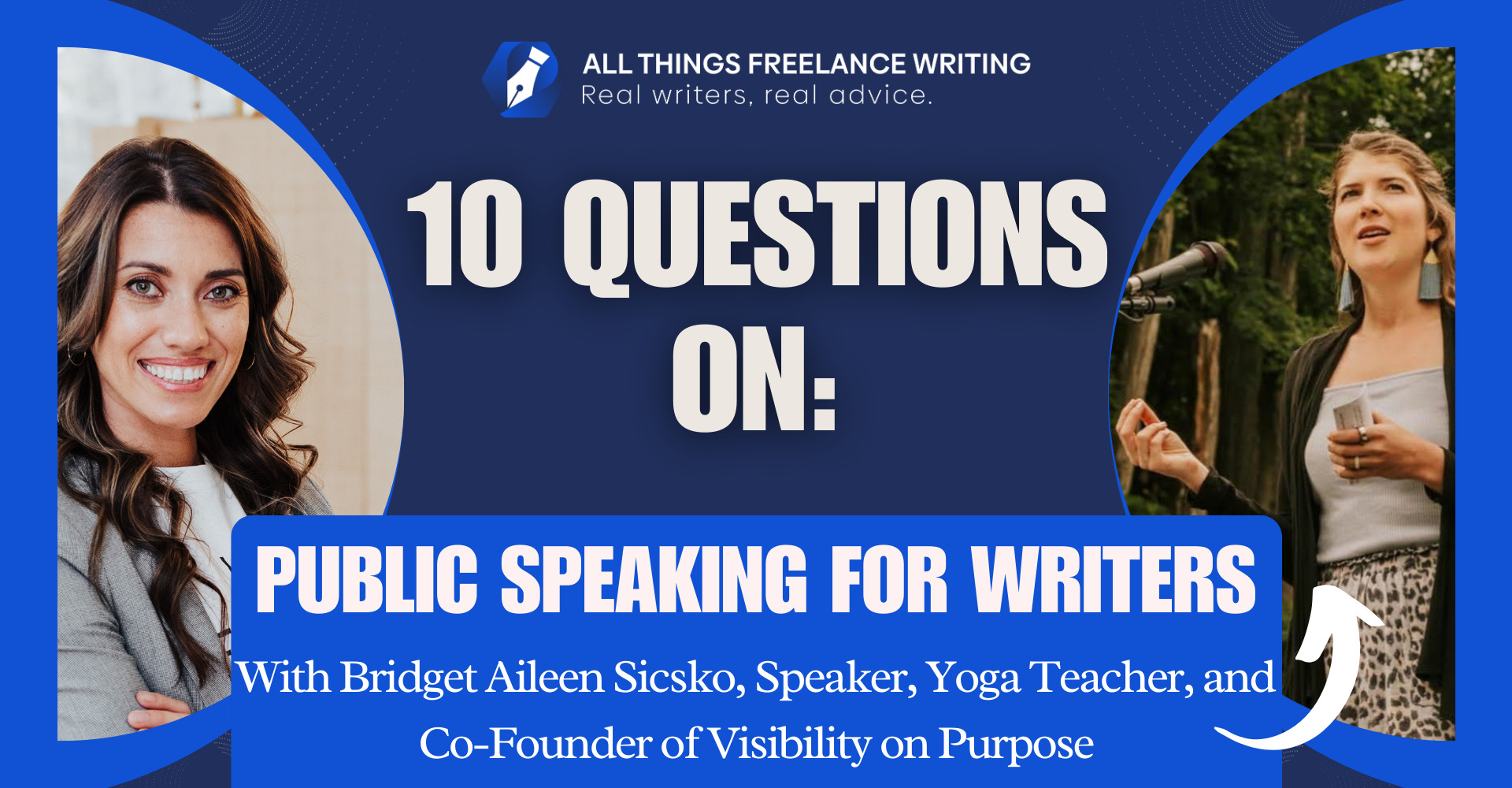Bridget Aileen Sicsko shares how public speaking engagements can help you grow your freelance writing business!
- What does Bridget do? She’s an experienced speaker, a yoga instructor, and the co-founder of Visibility on Purpose — a media training hub for online business owners (Learn more)
- How long has Bridget been speaking? 7+ years
- Where is Bridget from? New Jersey, USA
1. Hi and welcome! To get started, what types of speaking engagements would you say have the potential to benefit freelance writers?
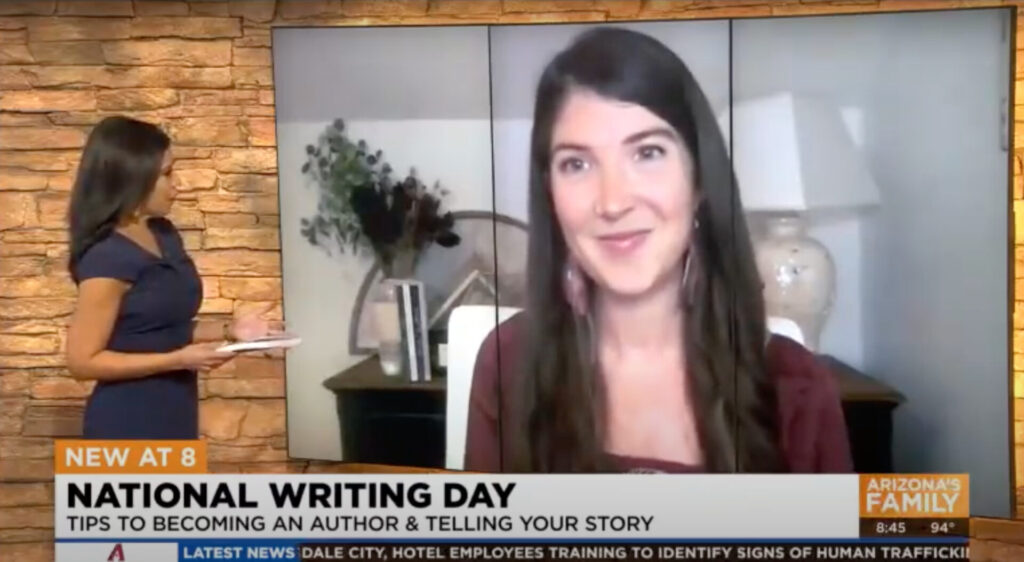
BAS: If you’re new to speaking, I’d always recommend dipping your toes in the water, getting some reps in, and practicing with people that you feel comfortable around.
Interviews like podcasts or social media lives tend to be more casual in nature so can be a great starting point if you go weak in the knees when thinking about speaking in front of a large, in-person audience.
If you see yourself speaking at conventions, conferences, and other events; landing in-person opportunities will be valuable so you can begin to build credibility and potentially create a speaker’s reel. Again, if you’re just starting, you can:
- Approach some local networking groups
- Offer lunch and learns at companies
- Offer other free talks to the right audiences to get more comfortable speaking in front of groups.
2. For freelance writers who are considering speaking engagements, what benefits would you say speaking can bring to their careers?
BAS: Set yourself apart from other writers
I always think back to that idea of “do things that others are unwilling to do”. Speaking, for many people, including most writers, leaves them weak at the knees. So as a freelance writer, there are many benefits to being the writer who also speaks. I’d say right away it would set you apart from other writers in your field who are focused on solely writing.
Improve your self-inquiry and reflection skills
In addition, I’ve found that speaking actually helps people process their thoughts, experiences, and goals. So if you’re a writer who desires to speak, I believe that speaking can actually propel your self-inquiry and reflection skills.
Grow your network
Speaking is also a great way to meet people. For instance, let’s say you’re a writer who’s interviewed on a podcast — when that episode comes out, you’re now being introduced to an entirely new audience that you likely wouldn’t have been introduced to otherwise. Further, when you speak in person, you can network and build relationships with people who can help you move the needle forward.
“As a freelance writer, there are many benefits to being the writer who also speaks.”
Bridget Aileen Sicsko
3. For those who have no media training and little to no speaking experience, what would you say they should keep in mind during their first speaking engagement?
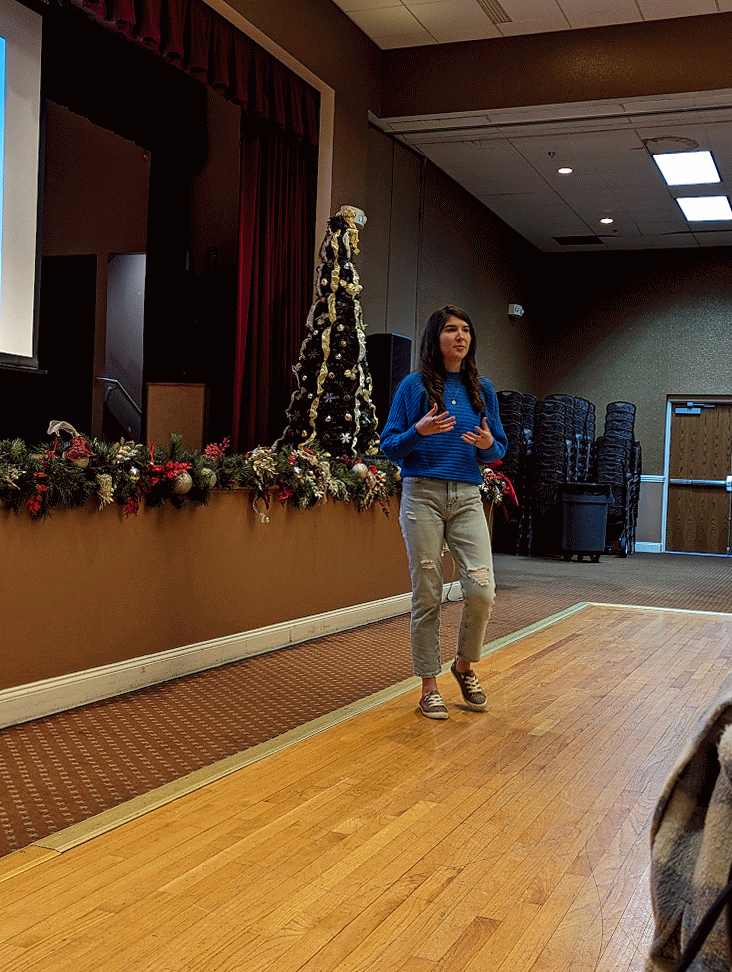
BAS: “Speaking is not a spectator sport, you have to get in the ring”, is one of my favorite things to tell people. It’s not really something you can learn in a book and master. It takes practice. So my first piece of advice is practice, practice, practice.
When I am preparing for a speaking engagement, I usually write down my thoughts for the talk and then begin to practice in front of a mirror. That way I can see my posture, hand gestures, and movements. From there, I will ask to practice in front of my husband or a friend.
So for the writer who has landed their first speaking engagement (even if it’s a podcast interview), have someone interview you and practice, practice, practice.
It will feel more natural the more that you are used to speaking about yourself, your story, and the relevant topic. In addition, recording yourself speaking and watching it back (I know that it sounds cringe), can be a huge needle mover to make objective changes to your speaking style.
“It’s not really something you can learn in a book and master. It takes practice.”
Bridget Aileen Sicsko
4. What are some of the super common mistakes people make when they first start speaking/doing interviews?
BAS: Let’s break this one down into two parts.
1. For interviews, the biggest mistake I see is when the interviewee is asked to tell the host about themselves, and they go down this long-winded rabbit hole of their entire life story.
2. For in-person speaking engagements, the biggest mistake again relates to practice but usually from the perspective of stage presence and delivery. Most people don’t know how to use the stage space, overuse filler words such as “like” or “um” and speak too quickly.
5. And how writers can prevent making those mistakes?
BAS: To avoid a long-winded monologue: I recommend using a simple framework for storytelling that includes:
- What prompted you to get into the work you’re doing today (a conflict, opportunity, challenge)?
- What was the aha (the solution/lesson to said challenge or opportunity)?
- And how does that inform the work you’re doing today (this part allows you to plug what you’re currently working on)?
- Practice telling a shortened version of ”your story” before being interviewed.
To overcome delivery and stage presence challenges: Practice, practice, practice fixes all of this.
6. If freelance writers have an interview coming up, what level of preparation do you recommend?
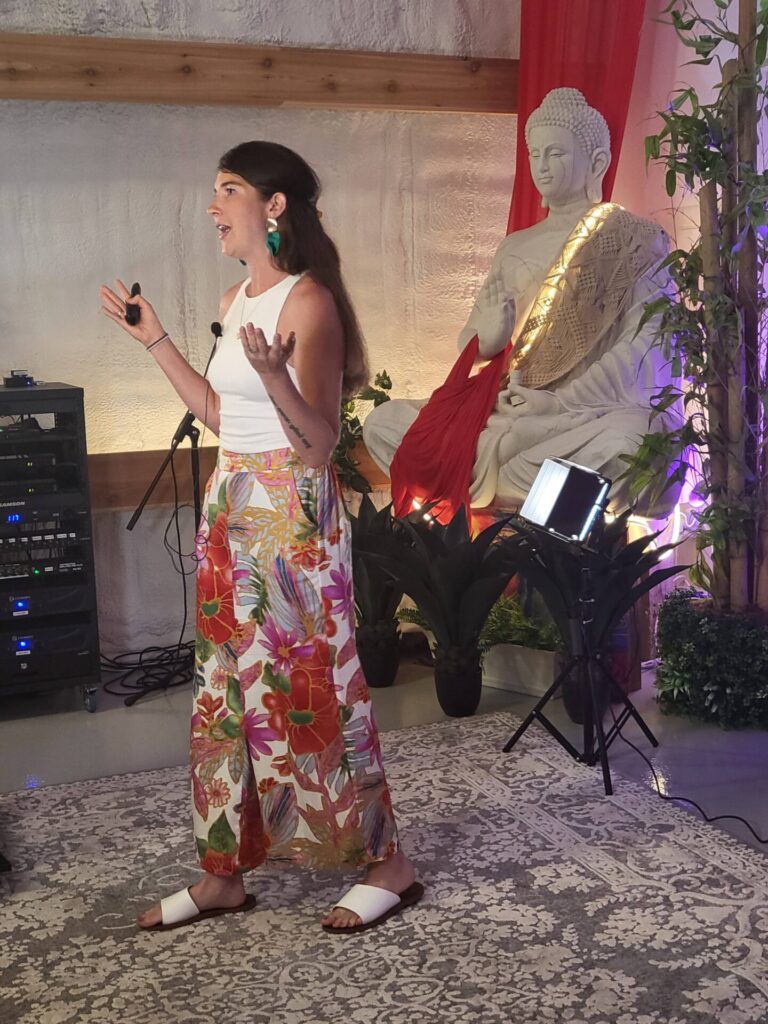
BAS: My recommendation for writers is to practice in front of people, ask for feedback, talk to themselves in their car, record themselves (and listen to it back—I know, awkward! But it works!) and find your sweet spot. At the end of the day, knowing your content inside and out, and enjoying talking about it makes all the difference to show up more organically.
I find everyone has a different memorization style, but for me, the first thing I like to do is make sure I truly understand what I’m trying to communicate — we can call this the “core message”. That way, even if I lose my place when I’m speaking, I can always come back to the main point I’m trying to make.
7. For those who have fears and/or anxiety tied to speaking, do you have advice for addressing and working through those?
BAS: I’m a big believer in patterning our experience to build our confidence. Here’s what I mean by that.
Get in some reps
When it comes to speaking, I think a lot of the nerves come from a lack of confidence, experience, and action.
If you’ve never spoken before; dream big, but start small. Have a friend interview you. Go on an IG or LinkedIn live with a colleague to have a casual conversation.
Work on getting some reps in to build the confidence and the pattern. Once you do this, you can begin to adopt the identity that yes, you are in fact a speaker.
Use visualization, breathing, and journaling techniques
I also believe in using visualization, breathing, and journaling techniques before speaking.
When I am preparing to speak, I always grab my notebook and write a journal entry as if the speaking engagement has already happened. I am essentially tricking my mind and body to “feel the wish fulfilled” as Neville Goddard said.
I will allow myself to free write about how amazing the event was, the incredible people I met, how I felt speaking — all with the intention of giving myself the necessary confidence to perform at my best.
I also sit in meditation and use the power of my mind to see myself talking on stage. I will use all five senses to create the experience and the pattern in my body before it actually happens.
“I will use all five senses to create the experience and the pattern in my body before it actually happens.”
Bridget Aileen Sicsko
8. Can you share a bit about how/when/why you got into speaking?
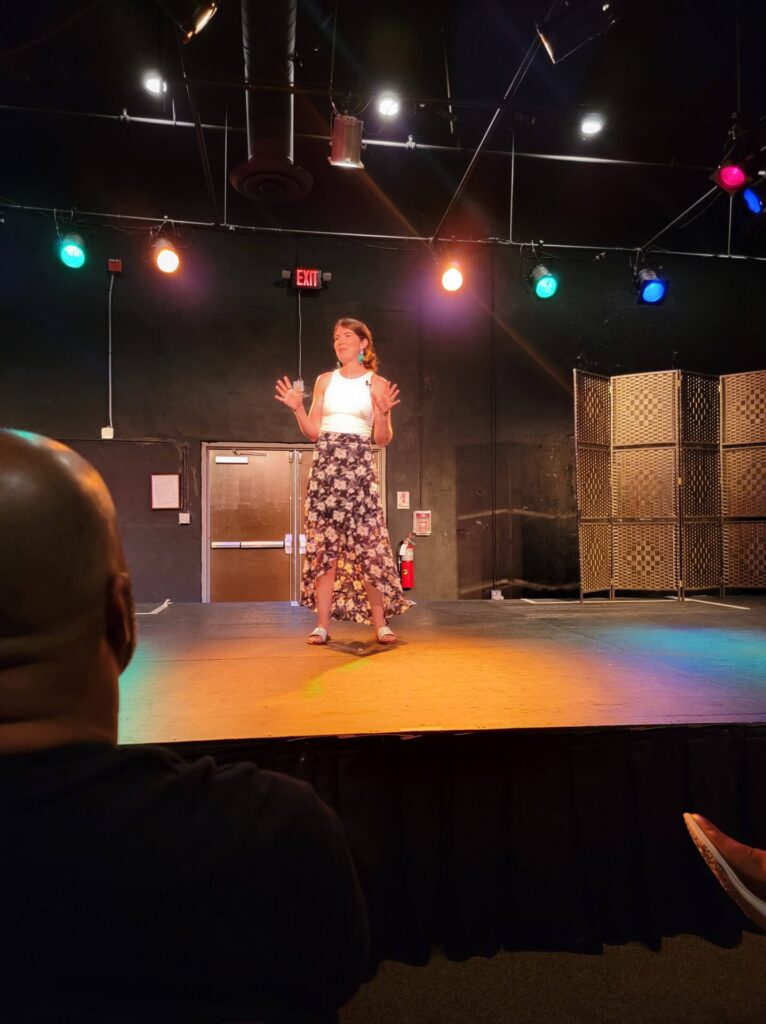
BAS: In college, I was part of a co-ed professional business fraternity called Alpha Kappa Psi. It was all about resume writing, building businesses, public speaking, the stock market and really…all things business. Public speaking was a huge part of being a member of AKPsi and we regularly had to give presentations on our business plans and the stock market.
At the time, I realized I did have a bit of a natural ability for speaking and began to learn my own process for memorizing content. Looking back, I now attribute some of that “natural ability” to being the daughter of a performer, singer, and actor who would gladly give me feedback on things like articulation, tone, posture, and conviction.
I am so grateful for my upbringing and college experience that inspired me to build a speaking career. Now I get to speak on stages, podcasts, and even TV about the topics that excite me the most — human optimization, wellness, Ayurveda, yoga, pattern disruption, and visualization techniques. It just feels fun!
9. What do you love about speaking and what keeps you coming back for more?
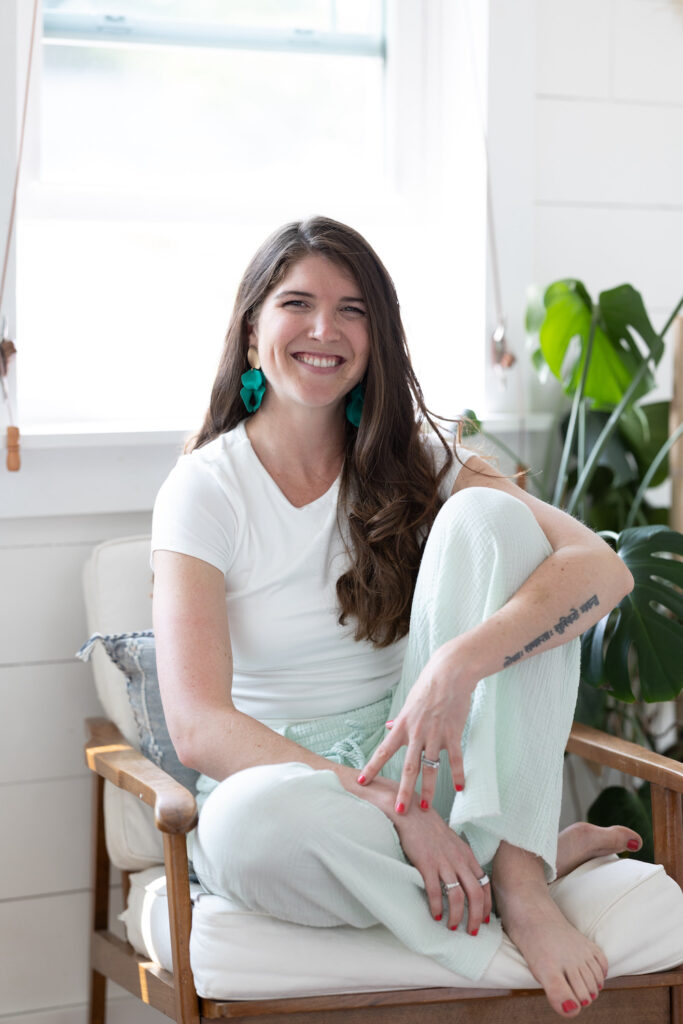
BAS: Speaking makes me feel so alive. The funny thing is that I still get nervous even though I’ve spoken in front of thousands of people over the years. I’ve had 600 6th-8th graders staring at me as I stood in front of them and been flown to Europe to speak, and yet I still get nervous.
For me, the thing that keeps me coming back is knowing that people really appreciate my message. They email and message me thanking me for my talk. And, on a personal note, speaking takes me to the edge of my comfort zone — so as someone who talks about human optimization, performance, and lifestyle, I need to practice what I preach.
Speaking lights up my soul, feeds my heart, and connects me with some of the most amazing individuals.
“Speaking lights up my soul, feeds my heart, and connects me with some of the most amazing individuals.”
Bridget Aileen Sicsko
10. Lastly, what are you up to in 2024? What should we should keep an eye out for?
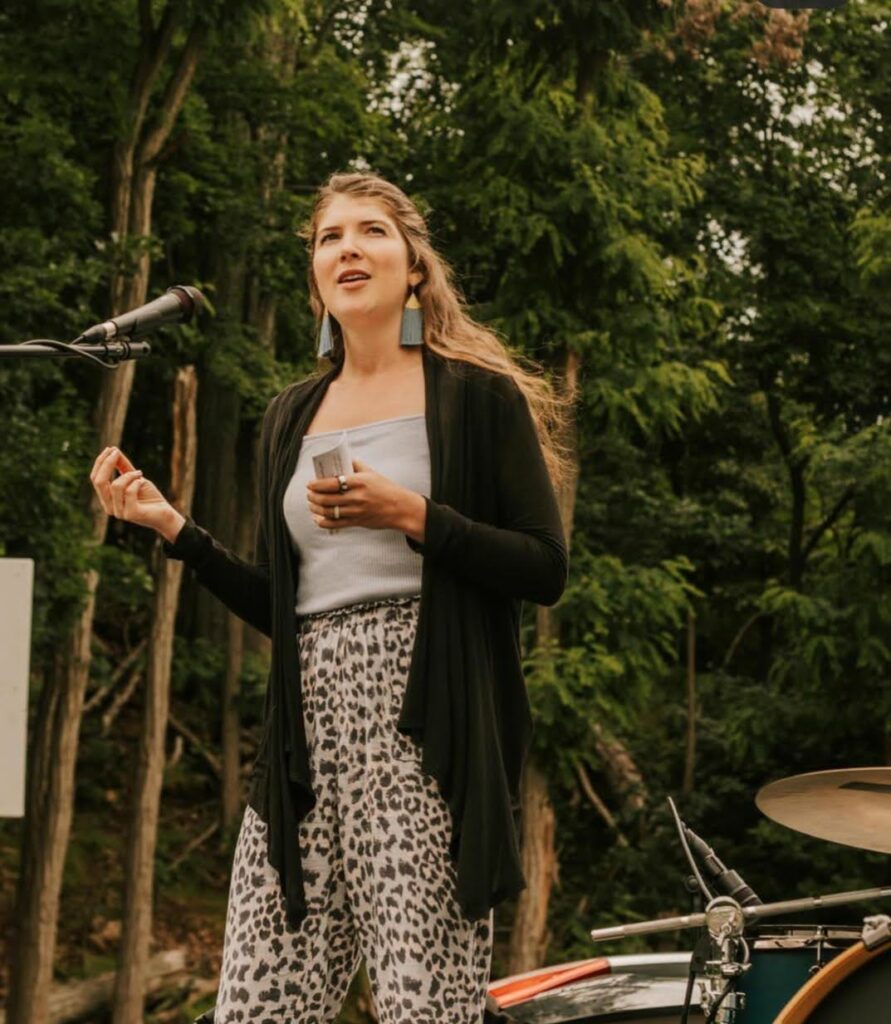
BAS: Ironically, 2024 is my year for more speaking. For the past 2-3 years I’ve been focused on building businesses where I helped other founders get on podcasts, publish books, and get featured in the media — but now it’s my turn for myself again. I’m really excited to continue to build my own speaking career, refine my talks and topics, and do what excites me most.
In addition, my PR and Media company, Visibility on Purpose, is starting to gain more traction. We teach business owners, authors, and personal brands how to land publicity (TV interviews, podcasts, and media features) without hiring a publicist, so keep a lookout for what we’re doing there. And hey, if you like this Visibility stuff, you can listen to our podcast, Visibility Era!
Psst…I (Jessica) had the great pleasure and honor of being a guest on the Visibility Era podcast — listen here!
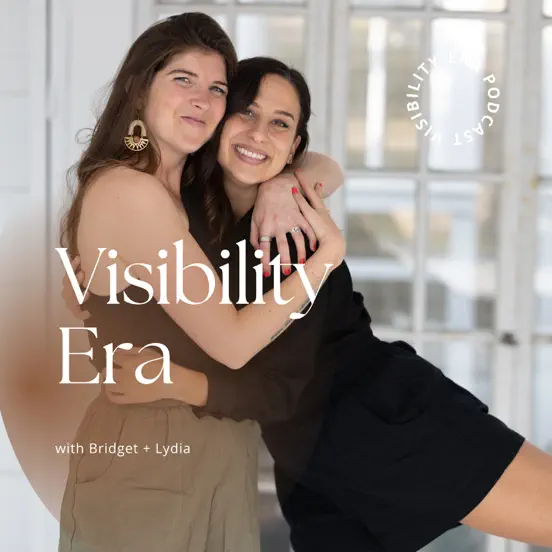
Where can you find and follow Bridget online?
A HUGE thank you to Bridget for sharing her experience and insights with the ATFW community!


